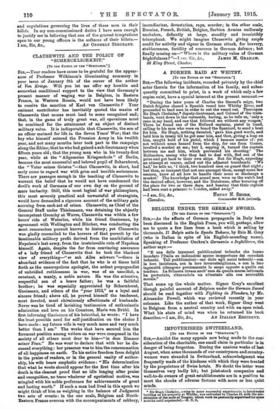CLAUSEWITZ AND THE POLICY OF "SCHRECKLICHKEIT."
[To ran Emelt or In "Sraersros.")
Sill,—Your readers have cause to be grateful for the appear. aaoe of Professor Wilkinson's illuminating summary in your issue of January 9th of the career of the author of Von Kriege. Will you let me offer my humble and somewhat conditional support to the view that Germany's present manner of waging war in Belgium, in Eastern France, in Western Russia, would not have been likely to receive the sanction of Karl von Clausewitz P Your eminent contributor has inevitably quoted the maxim of Clausewitz that means most lead to some recognized end; that, in the game of truly great war, all operations must be combined for the attainment of an object of distinct military value. It is indisputable that Clausewitz, the eon of an officer maimed for life in the Seven Years' War; that the boy who himself entered the Prussian Army in his twelfth year, and not many months later took part in the campaign along the Rhine; that he who bad gained a sub-lieutenancy when fifteen years old; that the young man who in his twenty-first year, while at the " Allgemeine Kriegsschule " of Berlin, became the most successful and beloved pnpil of Scbarnborst, the " Vater seines Geietee "—that Clausewitz, in short, had early come to regard war with grim and terrible seriousness. There are passages enough in the teaching of Clausewitz to warrant the belief that he would not have condemned the devil's work of Germans of our own day on the ground of were barbarity, Still, this most logical of war philosophers, this most severely practical and unwasteful of strategists, would have demanded a rigorous account of the military gain accruing from each act of crime. Clausewitz, as Chief of the General Staff under Thielemann, was detaining the abjectly incompetent Grouchy at Wavre, Clausewitz was within a few hours' ride of Waterloo, while his friend Gneisenau, by agreement with Wellington and Blucher, was conducting the most remorseless pursuit known to history; yet Clausewitz was gladly reconciled to the horrors of that pursuit by the inestimable military profit derived from the annihilation of Napoleon's last army, from the irretrievable ruin of Napoleon himself. Again, despite the far from convincing assurance of a lady friend of Clansewita that be took the blackest view of everything—" er Bah Idles schwarz "—there is abundant evidence of the fact that he who is at times held forth as the unscrupulous apologist, the ardent propagandist of unbridled ruthleeeness in war, was of an unselfish, a constant, a manly, a noble nature. He was the attentive, respectful son of a brave father ; he was a faithful brother; he was especially appreciated by Scharnhoret, Gneisenau, and others of the "year 1813," as a loyal and sincere friend; above all, he proved himself the tenderest, most devoted, most chivalrously affectionate of husbands. Never was he tired of lavishing testimonies of enthusiastic admiration and love on his Countess, Marie von Brun In first informing Gneisenau of his betrothal, he wrote: "I bare the least possible need for self-justification on the choice I have made my future wife ie very much more and very much better than I em." The works that have Bemired him the foremost position among writers on war were composed in the society of all others most dear to him—" in dem Zimmer seiner Frau." He was wont to declare that with her he dis- cussed everything : her presence was to him the consummation of all happiness on earth. To his entire freedom from delight in the praise of readers, or in the general vanity of author- ship, his wife bears emphatic evidence: "His determination that what he wrote should appear for the first time after his death is the clearest proof that no idle longing after praise and recognition, no trace whatever of egotistical motive, was mingled with his noble preference for achievements of great and lasting worth." If such a man had lived in this epoch we might think of him as weighing in the balance of Judgment two sets of events: in the one scale, Belgium and North- Eastern France overrun with the accompaniments of robbery, incendiarism, devastation, rape, murder; in the other scale, Russian, French, British, Belgian, Serbian Armies uniformly unshaken, defiantly at large, steadily and irresistibly triumphant. We might imagine Clausewitz giving ample credit for activity and vigour in German attack, for bravery, stubbornness, fertility of resource in German defence ; but finally musing on—" Where is the military value of German frightfulness P "-1 or:, Sir, do., JAMES M. GRAHAM. 86 King Street, Chester.


































 Previous page
Previous page